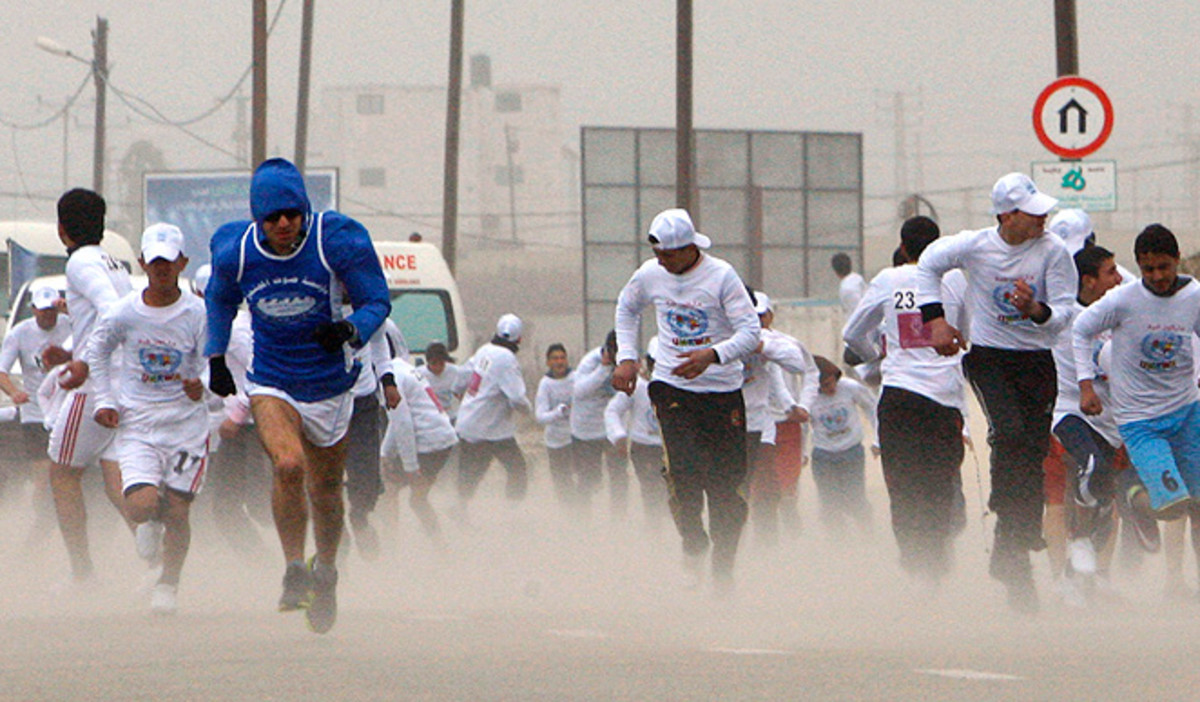UN cancels Gaza Marathon for banning women from running

Runners brave the elements in the 2012 Gaza Marathon. The 2013 race was canceled for banning women from participating.
Adel Hana/AP
GAZA CITY, Gaza Strip (AP) -- The United Nations on Tuesday canceled a planned marathon in Gaza after the Palestinian territory's Hamas rulers banned women from participating, in a new attempt by the Islamic militant group to impose its ideology inside the crowded coastal strip.
The dispute threatened to further strain the already delicate relationship between Hamas and the United Nations. Gaza sportswomen met the news with resignation, saying their conservative society had made it difficult to train even before the ban.
Since seizing power in Gaza in 2007, Hamas has issued a number of edicts meant to constrain the freedoms of women. But a number of these initiatives fizzled in the face of public opposition, making the ban on female runners somewhat surprising. Hamas had also recently relaxed some of its earlier orders imposing its conservative interpretation of Islamic law.
Gaza's Cabinet secretary, Abdul-Salam Siam, said women running in public violated Palestinian customs.
"We don't want women and men mixing in the same race," Siam said. "We don't want any woman running uncovered."
Siam said girls could join the event, just not grown women. The race, scheduled for April 10, would have been the third annual marathon in Gaza. Siam would not say why Hamas did not ban women from the two previous races in 2012 and 2011.
The race was meant to run the entire length of the tiny territory - which is slightly shorter than the official length of a 26.2 mile (42-kilometer) marathon. Some 800 people registered, including 266 Palestinian women and 119 women from abroad, U.N. spokesman Sami Mshasha said.
Mshasha said the U.N. was surprised when Hamas officials informed them that women couldn't participate because organizers have always been careful to ask participants to dress modestly to avoid offending Gaza residents. Most donned full-length running pants and long-sleeved shirts in previous races.
The United Nations Relief and Works Agency, known as UNRWA, assists Palestinian refugees and their descendants throughout the region. In Gaza, the agency runs dozens of schools and medical clinics and distributes food to many of the territory's 1.6 million residents.
But Hamas has frequently squabbled with UNRWA in a rivalry for the hearts and minds of Gaza's people. Hamas has pressed the U.N. not to organize mixed folkloric dancing for boys and girls; to keep Holocaust education out of its curriculum and it has used harsh rhetoric against previous senior U.N. officials.
Gaza rights groups urged the U.N. to defy Hamas and hold the marathon, arguing the militant group has no right to discriminate against women's participation.
The marathon was initially organized to draw attention to Gaza, at the time under an Israeli and Egyptian blockade that was imposed since the militant group Hamas seized power. The blockade has since loosened, although restrictions remain on exports and imports of some raw materials. It also remains difficult for Palestinians to leave Gaza.
Islam has no specific ban on women running, even under the conservative interpretations that most Palestinians follow. But some Gaza residents, including Hamas members, follow even sterner tribal norms that frown on women moving in ways that allow their body shape to be discerned.
The vast majority of Gaza women don Muslim headscarves that cover their hair. Many also wear long, loose robes to conceal their figure. A growing number also cover their faces. The minority of Gaza women involved in sports tend to exercise indoors.
Gaza residents appeared conflicted over the ban.
Enas Mekky said women should be allowed to run as long as they dress modestly. "As long as (women)'s dress doesn't breach public morality, there shouldn't be any problem," she said.
But Gaza runner, Nader Masri, 33, who represented Palestine in the five-kilometer race in the 2008 Beijing Olympics, said the territory's conservative culture made the idea of women running in public impossible.
"Who would allow his daughter or sister to run in the street?" Masri aasked. "When a girl of 16 or 17 is running in the street, that's not acceptable."
Some female athletes said they didn't even bother to sign up because their fathers and husbands didn't want them participating.
"My dad told me that I'm a pretty woman now, and not a girl anymore, so I can't run in the streets. It will be a headache for him because people will gossip," said Noura Shukri, a 15-year-old high school student who ran in the first two races.
Hamas officials have tried before to crack down on behavior deemed contrary to its interpretation of Islam, including banning women from riding on the backs of motorcycles.
But other efforts, including banning women from smoking water pipes, barring men from working in women's salons, and making women cover their hair in courthouses were rescinded after outcries from rights groups.
The militant group has grown more tolerant since the Arab spring, where citizens ousted secular dictators in Tunisia, Egypt, Libya and Yemen, voting in Muslim-orientated governments.
Gaza's Hamas leaders have been under pressure from members abroad to show a moderate face, fearing any new attempted crackdowns in the territory would reflect badly on their ideological partners poised to take power throughout the region.
As such, the cancellation suggested Hamas hard-liners in Gaza were regaining the upper hand in the militant group, Gaza political analyst Mukheimar Abu Sada said.
"The decision highlights the influence of the hard-liners in the Gaza government," Abu Sada said.





